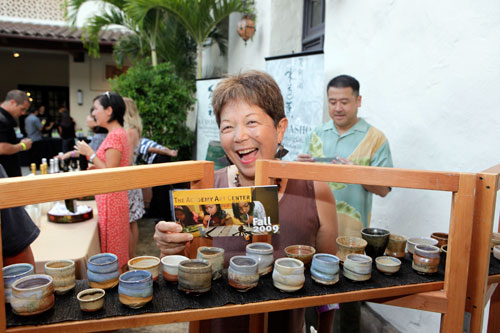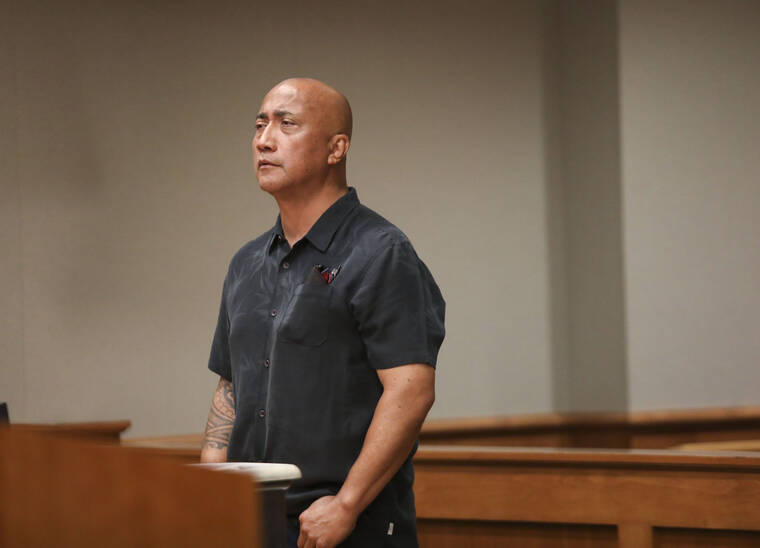Drinks delight

Ceramists Charlene Tashima, center, and Barry Nakamura, right, showed their sake cups at last year's Joy of Sake Festival at the Honolulu Academy of Arts. They will be back at this year's event.

Bottles of chilled sake are ready to be served. This year's event features 329 different sakes.


After 10 years, one could say the Joy of Sake Festival has mellowed like a fine — well, sake. But mellow is hardly an apt description for an event that will provide food, music and plenty of good cheer, not to mention the 300-plus sakes that will be offered up for tasting.
"Since 2000, there’s been a seismic shift in the interest in sake," said organizer and sake connoisseur Chris Pearce. "All of a sudden everybody got excited about it."
The nonprofit touring festival returns Thursday to the grounds of the Honolulu Academy of Arts, where 329 sakes, 164 of which are usually unavailable outside of Japan, will be available for tasting. A total of 166 breweries sent samples of their wares to Honolulu, where they’ve been locked away in refrigeration for the past week.
JOY OF SAKE FESTIVALSome 329 sakes are available for tasting, with food from Chai’s Island Bistro, Doraku, Hoku’s, Lewers Lounge, Nobu Waikiki, Hakkei Honolulu, Gyotaku, Town, Yuzen, Zenshu, Marians Island Wide Catering and Cakeworks; and music by Kit Ebersbach & Co. and vocalist Starr Kalahiki. Where: Honolulu Academy of Arts, 900 S. Beretania St. When: 6 to 8:30 p.m. Thursday, Aug. 19 Don't miss out on what's happening!Stay in touch with breaking news, as it happens, conveniently in your email inbox. It's FREE!
By clicking to sign up, you agree to Star-Advertiser's and Google's Terms of Service Opens in a new tab and Privacy Policy Opens in a new tab. This form is protected by reCAPTCHA.
Cost: $80-$150. A portion of the proceeds from tickets bought from the Arts Academy will go to the academy. Info: www.honoluluacademy.org/cmshaa/academy/sake.aspx Opens in a new tab or www.joyofsake.com/hi.html Opens in a new tab
|
"These sakes will be in peak condition," Pearce said.
The Honolulu festival is the first stop for the sake tour, which will go on to San Francisco, New York and Tokyo for similar events. The Honolulu festival is the only stop where the libations are judged, or "appraised," with an international panel of 10 judges awarding gold or silver certificates.
"It’s definitely prestigious to receive a gold award," Pearce said. "There is a big national appraisal in Japan, and smaller ones in regions and prefectures in Japan. But the U.S. National Sake Appraisal (the formal name for the Honolulu tasting) is one of the biggest and most prestigious, in terms of number of entries and number of people attending the public tasting."
The evening will also feature a somewhat unusual event for the sake festival: the naming of a top sake.
"In Japan, they frown on that," Pearce said. "But since it’s the 10th year, we’re going to announce a winner."
In addition, the points compiled by individual breweries over the past 10 years will be tallied to pinpoint the best brewery.
Chris Johnson, a top finisher in a Japanese sake-testing competition in 1999 and a judge for all 10 years of the Honolulu festival, said an outstanding sake is one in which "the taste is well-balanced, allowing the aroma to give way to the flavors of the rice and yeast, and the finish lingers, reminding you of the aromas that you began with and an aftertaste that is clean, leaving you wanting another sip."
Johnson said via e-mail, "We will see a lot of sakes that we may not have tasted before as many are not available in the States at the moment, which is always exciting."
A dozen of Hawaii’s top restaurants will be contributing menus, specially selected to complement the sakes.
Hawaii played a key role in the development of sake after World War II, when Japanese research chemist Takao Nihei came to Hawaii to help revive the local industry.
Nihei brought both the traditional and newer scientific techniques to the islands, eventually staying on here to run the Honolulu Sake Brewery.
"He would have been one of the most famous sake brewers in Japan, but he wound up in Hawaii," said Pearce, who met Nihei in the 1980s. "The issei would say how meaningful it was to them."




